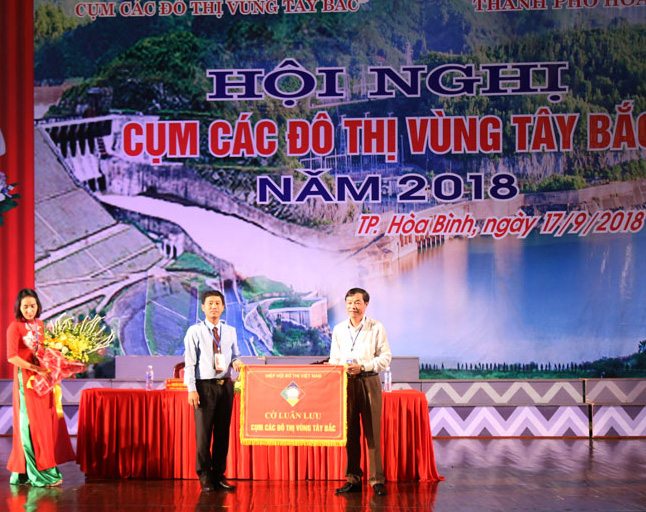
HBO – The People’s Committee of Hoa Binh city has hosted a conference of the cluster of urban areas in the northwestern region in 2018. Attending the event were Tran Dang Ninh, Standing Vice Secretary of the provincial Party Committee and Chairman of the provincial People’s Council; Bui Van Khanh, member of the Standing Board of the provincial Party Committee and Vice Chairman of the provincial People’s Committee; Nguyen Thi Kim Son, Vice Chairwoman of the Association of Cities of Vietnam (ACVN); and representatives from 10 cities and towns in the cluster and Hoa Binh city authorities.
Leader of the
Hoa Binh city People’s Committee hands over flag to Nghia Lo town of Yen Bai
province to host the next event
The cluster of northwestern urban areas comprises eight cities namely Ha Giang,
Son La, Lai Chau, Lao Cai, Tuyen Quang, Dien Bien Phu, Yen Bai and Viet Tri;
and two towns of Muong Lay (Lai Chau) and Nghia Lo (Yen Bai). Themed "Strengthening
State management of land use in urban development”, the conference offered a
chance for urban areas to exchange information, share experience, seek
cooperation opportunities, address difficulties in urban management, and
especially tighten sustainable solidarity among the areas.
Based on the emulation movement of building green, clean and beautiful urban
areas launched by the Association of Cities of Vietnam, the conference selected
five outstanding green, clean and beautiful urban areas in 2018, including Hoa
Binh, Lao Cai, Son La, Ha Giang cities and Nghia Lo town (Yen Bai) and proposed
the ACVN commend and reward these urban
areas.
The conference also discussed and agreed on the theme of action for 2019:
"Improving State management of land use in combination with urban development”,
as well as nominated Hoa Binh as the head of the cluster in 2019 and Nghia Lo
town of Yen Bai province as host of the next conference./.
Hoa Binh province is undergoing a dynamic transformation amid Vietnam’s national digital transition. Building on Poliburo’s Resolution No. 57-NQ/TW on breakthroughs in science, technology, innovation, and national digital transformation, the province has rolled out a wide range of practical action plans. A standout initiative is the "Digital Literacy for All” movement, an effort to ensure that no one is left behind in the digital era.
Hoa Binh province is undergoing a dynamic transformation in the wake of the national digital transformation movement. Building on Resolution No. 57-NQ/TW of the Politburo on breakthroughs in science, technology, innovation, and national digital transformation, the province has implemented a wide range of practical action plans. A standout initiative is the "Digital Literacy for All” movement ambitious effort to ensure that no one is left behind in the digital age.
With a spirit of unity and proactive problem-solving, the Party Committee, the government and the people of Dong Lai Commune (Tan Lac District) have made great strides in implementing the resolutions of the 24th Party Congress of the commune for the 2020 - 2025 term. Focusing on leadership and practical actions, the commune has brought the Party’s resolutions into daily life, creating strong impacts and pushing the local development forward.
Amid the nationwide push for digital transformation, young people in Hoa Binh Province are stepping up as dynamic pioneers, applying technology to enhance Youth Union operations and expand the reach of youth-led initiatives. Through creativity and adaptability, Youth Union organizations at all levels have introduced a series of practical solutions, contributing to modern governance and community development.
In recent years, An Nghia commune, located in Lac Son district, has stepped up administrative reform, focusing on improving the quality and efficiency of its single-window service unit for receiving and processing administrative procedures. These improvements have helped create favourable conditions for local residents and organisations to handle administrative procedures, contributing to the commune’s broader socio-economic development.
The Prime Minister-approved master plan to develop the multi-use value of forests ecosystems through 2030, with a vision to 2050, aims to improve the management and sustainable use of forest resources, create jobs, increase incomes, and improve the living standards of ethnic minorities, people in mountainous and remote areas, forest workers and those living near forests.



